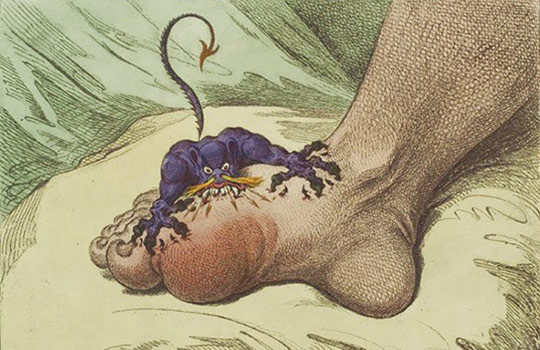Cherry picking originally meant “the action or practice of harvesting cherries” (Oxford English Dictionary). The term is recorded as having been first used in November 1849, in Godey’s Lady’s Book: “Recollections of a grown-up schoolboy. V.—Cherry-pickings, robbing orchards, and love-making”, one of a series by JF Otis, although it is hard to believe that there […]
Category: Jeff Aronson’s Words
Jeffrey Aronson: When I use a word . . . Wellerisms
We first meet Sam Weller (picture below) in Chapter X of The Posthumous Papers of the Pickwick Club, which was published serially between April 1836 and November 1837. “He was habited in a coarse-striped waistcoat, with black calico sleeves, and blue glass buttons; drab breeches and leggings. A bright red handkerchief was wound in a […]
Jeffrey Aronson: When I use a word . . . Gout

Richard Asher once commented, citing Pel Ebstein fever in Hodgkin’s disease as an example, that some clinical manifestations that are regarded as “typical” of certain diseases may be in fact rather uncommon or even non-existent. It is several years since I last saw a patient with gout that presented as podagra, affecting the big toe. […]
Jeffrey Aronson: When I use a word . . . Fake illnesses

Fake news is in the news. So what about fake illnesses? When Richard Asher described “a common syndrome, which most doctors have seen, but about which little has been written”, he called it Munchausen’s syndrome, because “the persons affected have always travelled widely; and their stories, like those attributed to [the famous Baron von Munchausen], […]
Jeffrey Aronson: When I use a word . . . Snakes, snarks, and boojums
Last week I discussed the origins of words to do with snakes, such as serpent and sepsis, derived from the IndoEuropean root SERP, meaning to creep or crawl. However, that wasn’t the only such root; SNEG was another. And while SERP led to Greek and Latin words, SNEG led to Teutonic ones, such as snail, […]
Jeffrey Aronson: When I use a word . . . Sepsis and septicaemia
A reader of The BMJ has written to the editor to ask for clarification of the terms “sepsis” and “septicaemia”. The answer could be said to be rather creepy. The IndoEuropean root SERP meant to crawl or creep. The Latin verb serpere meant to glide or crawl, to wind along like a snake, to extend […]
Jeffrey Aronson: When I use a word . . . Selenium
I have previously written about cadmium and lithium, two of three elements that were discovered in 1817. The third, selenium, was discovered by Jöns Jacob Berzelius (1779–1848), who is also credited with having discovered cerium, silicon, and thorium. Berzelius wrote that the similarity of its properties to those of tellurium had induced him to call […]
Jeffrey Aronson: When I use a word . . . Juniper
Milton Keynes was established as a “new town”, to relieve housing congestion in London, 50 years ago on 23 January 1967, an event that I did not think worthy of inclusion in my list of scientific anniversaries in 2017. However, the name of the town has medical resonances. Milton Keynes, which now has around 250 […]
Jeffrey Aronson: When I use a word . . . Discovering lithium
There are many ways of discovering effective medicines. One can, for example, investigate herbal remedies, endogenous agents in animals and micro-organisms, or drug metabolites; use applied pharmacology and empirical chemistry; or implement rational design based on a target or pathophysiology. Not infrequently chance plays a part, as in the case of lithium. Two hundred years […]
Jeffrey Aronson: When I use a word . . . Apoptosis
In their landmark paper in the British Journal of Cancer 45 years ago, Kerr, Wyllie, and Currie reported a phenomenon that they described as “controlled cell deletion”. They proposed calling it “apoptosis” and explained the term in a footnote, as follows: The word “apoptosis” (ἁπόπτωσισ) is used in Greek to describe the “dropping off” or […]